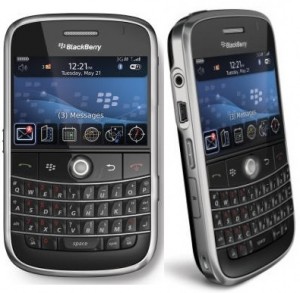
The United Arab Emirates, long regarded as one of the most business friendly economies in the Middle East, announced Sunday that starting in October it will prevent BlackBerry owners from sending and receiving e-mail and other messages and browsing the Internet because the security-minded government cannot adequately monitor those features on the popular electronic devices.
“Today’s decision is based on the fact that, in their current form, certain BlackBerry services allow users to act without any legal accountability, causing judicial, social and national security concerns for the U.A.E.,” the statement said on the Web site of the Telecommunications Regulatory Authority of the emirates.
There were indications that Saudi Arabia, the emirates’ neighbor, would follow suit. The Zawya Dow Jones news service said Saudi Arabia’s Communications and Information Technology Commission issued a memo to telecom firms operating in the kingdom to block BlackBerry’s service later this month. Zawya quoted an official who asked not be named and who gave no reason for the ban. The Associated Press issued a similar report, also quoting an unidentified telecommunications officials in that desert kingdom.
The ban would have no effect on other so-called smartphones that can access e-mail and the Web because the BlackBerry service is the only one that sends users data via computer servers overseas, thus eluding monitoring by the U.A.E. The device’s messenger service, which allows users to message other BlackBerrys for free, uses encrypted data that is processed through a Canada-based server. It was not clear if the order would affect foreign travelers with BlackBerry smartphones or only local users.
Messages left for Research In Motion, the Canadian company that manufactures the BlackBerry, were not immediately returned.
The U.A.E. is a federation of seven emirates in the southeastern corner of the Arabian Peninsula bordering Saudi Arabia. Among the seven states are Abu Dhabi and Dubai, both economic powerhouses that encourage international trade and discourage financing of radical Islamic movements.
With this decision, the U.A.E. has apparently chosen security over the potential business loss of banning BlackBerry, which is popular not only among Arab citizens throughout the Gulf but among expatriate business people in part because it offers protection against government surveillance.
The statement by the telecommunications agency suggested that BlackBerry has been in a running dispute with the emirates since at least 2007. The government regards electronic surveillance as an important tool against would-be terrorists and swindlers who might be drawn to the U.A.E.’s relatively open and unfettered environment.
Last year, Etisalat, the U.A.E.’s main state phone company, gave users an upgrade that turned out to allow Etisalat access to all the users’ messages. The upgrade also decreased battery life and made the phone get painfully hot, so people soon stopped taking the upgrade.
In the past year, two things have increased the U.A.E.’s concern about the BlackBerry issue. The U.A.E. government, like all the gulf’s autocratic governments, was alarmed by the Iranian election of 2009, which showed how the Internet can be used for anti-government purposes by a determined opposition. Second, the killing of the Palestinian operative Mahmoud al Mabhouh in a Dubai hotel in January, with evidence that it was carried out by a Mossad hit team, infuriated the U.A.E. government, which wants to maintain its tourist and business-friendly image. The incident heightened the government’s desire for electronic surveillance and security.
The BlackBerry has a big market penetration in the gulf area because of its security against government eavesdropping.
“It’s the perfect platform for debate, civil society and even opposition,” said Christopher Davidson, a British scholar who has written books on Dubai and Abu Dhabi. Last week, an Internet protest over increased gasoline prices in the U.A.E. was organized through BlackBerry messenger.
“This has all kinds of ramifications,” Mr. Davidson said. “What happens to users in these countries? What impact will this have on non-Emiratis, and on Dubai’s economy?”
Although Abu Dhabi, the largest of the seven emirates, has vast oil reserves, Dubai does not, and is still struggling to recover from the crash of its real estate market, which pushed it deep into debt.
In the statement by the U.A.E.’s telecommunications agency, Mohamed Al Ghanim, the director-general , said that as of Oct. 11, “BlackBerry Messenger, BlackBerry Email and BlackBerry Web-browsing services will be suspended until an acceptable solution can be developed and applied.”
He said that the agency had informed both state-run phone companies, Etisalat and Du, that they should offer smartphone users “the option of alternative services” because ensuring continuity of service after October 11 “is the most important priority.”
“The T.R.A. notes that BlackBerry appears to be compliant in similar regulatory environments of other countries, which makes non-compliance in the U.A.E. both disappointing and of great concern,” Mr. Al Ghanim added.
Government monitors in the U.A.E. already block any Web sites whose content clashes with the conservative Islamic values of the country or could benefit local dissidents. NYT

Leave a Reply
You must be logged in to post a comment.